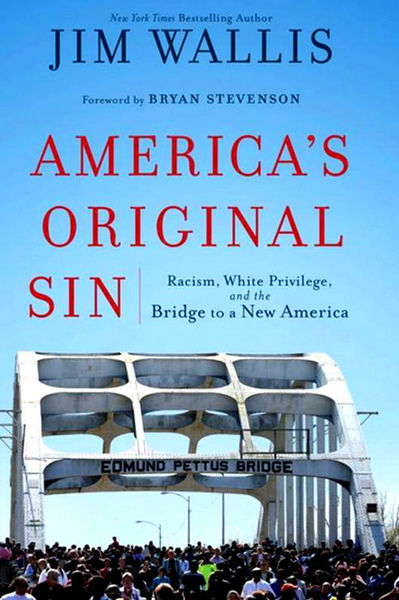‘America’s Original Sin’ is profound
Published 1:00 am Sunday, March 6, 2016

- sunread_book_sin
“America’s Original Sin: Racism, White Privilege and the Bridge to a New America” by Jim Wallis. Grand Rapids, Mich.: Brazos Press (The Baker Publishing Group), 2016. 272 pages, $21.99.
“In John 8:32, Jesus says, ‘You will know the truth, and the truth will make you free,’ which is one of those moral statements that breaks through the confusion and chaos of our lives,” Jim Wallis asserts in “America’s Original Sin: Racism, White Privilege and the Bridge to a New America,” his analysis of the current status of race relations in the United States.
Trending
“Untruths that we believe are able to control us, dominate us and set us on the wrong path,” he writes. “Untruths are burdens to bear and can even be idols that hold us captive – not allowing us to be free people who understand ourselves and the world truthfully.”
Perhaps the most defining feature of “America’s Original Sin” is the author’s spiritual frame of reference that permeates virtually every page of this compelling treatise. Those who possess a familiarity with the scriptures he consistently quotes will probably appreciate the narrative more than individuals less acquainted with the Bible, although many of the passages collectively could serve as an efficient primer on the teachings Wallis explains so efficiently. While the man has assumed many roles during his relatively long career – social activist, political pundit, cultural critic and academic scholar – he is first and foremost a theologian. His background and training serve him well in his latest effort, which is already in use as a supplemental text in several prestigious seminaries as well as a few secular institutions.
Adding to the book’s credibility is the author’s intimate involvement in many events that form the scaffolding on which his central thesis is constructed. This historical context provides him with an instrumental vantage point from which to interpret the racial tensions dominating our nightly newscasts. The enduring conflict between police officers and people of color is a concern that consumes a disproportionate share of the ink it took to produce this seminal contribution to the sociological canon.
“Not being able to trust the law enforcement in your community – especially in relationship to your own children – is a terrible burden to bear,” Wallis emphasizes in the inaugural chapter. “The stark difference in the way young black men and women are treated by police and our criminal justice system compared to white children is a deeply personal and undeniable structural issue for every black family in American society.”
The book consists of a preface and introduction followed by 10 chapters and an afterward. What distinguishes this particular volume from the plethora of other attempts to address the unfortunate consequences of racism in this country is the way Wallis uses his subjective experience as a canvas on which to paint this incredibly perceptive and moving indictment of how some segments of our population have treated, and continue to treat, other segments. Beginning when he was a teenager in Detroit in the 1960s, he describes the impact racism has had on his life. There are distinct advantages to having this kind of historical background from which to operate, and Wallis uses the insights he has gleaned in an amazingly effective manner.
“Most scholars believe that human civilization began in Africa or in the Middle East and that human migration moved out from there,” Wallis notes in the second chapter, one of my favorites. “Skin color would develop in different climates and cultures over the many years of human existence. But to suggest that differences in skin color would or should change the created reality of all human beings, made in the image of God, is both preposterous and profoundly evil. …
Trending
“And ‘sin’ is the right word to use for racism, as we’ve been suggesting, because it’s something that seeks to undermine the very creation of human beings as being equally valued, loved and cared for in the eyes of God,” he writes. “Our worth as men and women comes from all of us being the children of God, and all other political affirmations of our equality derive not just from governments but directly from our identity as God’s equally valued children.”
Wallis graduated from Michigan State University and subsequently attended Trinity Evangelical Divinity School. He was a member of Students for a Democratic Society and was active in the civil rights movement. His resume includes teaching at Harvard and Georgetown. More recently, he served on the White House Advisory Council on Faith-based and Neighborhood Partnerships and is a member of the Global Agenda Council on Values of the World Economic Forum. The founder and editor of Sojourners magazine, his previous 12 books include “On God’s Side: What Religion Forgets and Politics Hasn’t Learned About Serving the Common Good,” “Rediscovering Values: A Guide for Economic and Moral Recovery,” “The Great Awakening: Reviving Faith & Politics in a Post-Religious Right America” and “God’s Politics: Why the Right Gets It Wrong and the Left Doesn’t Get It.”
“Our highest and most inspirational points as a nation have been when we have overcome our racial prejudices; our lowest and ugliest points have been when we have succumbed to them,” Wallis concludes. “Race is woven throughout the American story and each of our own stories. All of our stories can help to change the racial story of America. I hope you will join me in this hard but critical – and ultimately transforming – conversation.”
So much of what we read these days focuses on the utilitarian implications of the sorry state of race relations in America. This being the case, it is refreshing to find someone who approaches the present state of affairs from a more philosophical perspective. I believe Wallis has something profound to contribute to the discussion; if you care about the future of our country, this is one you’ll want to add to your reading list.
— Reviewed by Aaron W. Hughey, Department of Counseling and Student Affairs, Western Kentucky University.






